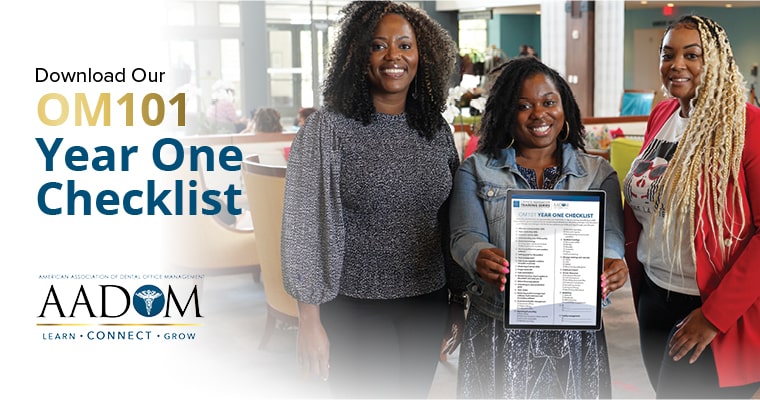New Employee Training: The Secret to Having a Successful Team

Are your new team members properly trained, or do you throw them into the fire to see if they come out on the other side?!
Every dental office I’ve worked with has one thing in common:
The new employee training is sub-par or nonexistent.
Why is that, and how do we, as dental office managers, fix it?
Keep reading to learn how you can implement tips on making your dental practice stronger with your team.
A broken process
Here’s a typical scenario.
Once we complete the interview process and extend an offer, the new team member reports to work.
That first day, we take them to their new desk or clinical op and trust that the team member they’ll be working with will accurately and adequately train them.
Unfortunately:
Knowledge falls through the cracks, and nine months later, the new team member that wasn’t properly trained in the first place is doing their own new employee training!
And it leads us into wondering why they’re:
- Under-performing
- Not understanding their job
- Frustrated that they have to fumble through the day
Sure, some will come out on the other side months later and perform to a level that you expect.
But what if they were able to achieve that status faster and more effectively so that they could properly help that next team member?
Have you ever asked a team member about a system or task that you thought was still in place only to find out it’s no longer being used?
Somewhere along the way, someone didn’t pass it along to the new team member. As a result, it’s no longer being done correctly.
There’s a way to fix this problem, though.
It’s called (proper) new employee training!
Training a new team member
New employee training should start on day one.
As much as we want them to get down to business, several things should happen first:
Your office handbook should be read and signed off.
Your handbook should include not only what you expect from them but what they can expect from you.
It should contain:
- Their benefits such as vacation, holiday pay, and any insurance or 401k perks you offer
- Policies for work hours and lunch breaks
- How and when they’re paid
- Scheduling vacation and sick time
There are several other items it might include, such as:
- Internet use
- Employee dental benefits
- Uniforms
- Any personal appearance policies, etc.
Next, the new team member should complete HIPAA and OSHA training.
Because we’re required to have OSHA and HIPAA courses to work in a dental office, we often feel they’re already well versed in this, and we don’t need to provide them with our own training.
Your compliance coordinator should have a list of videos and written information that every new team member must complete before reporting to their position.
A part of this training should include a detailed tour of the office to point out:
- Eyewash stations
- Fire extinguishers
- AED and crash cart
- Basic medical supplies such as Band-Aids and ointment
Our dental office partners with Dental Compliance Specialists; they have a very comprehensive compliance program complete with all the needed training videos for new and existing team members.
Finally:
You should have training on office communication and patient care.
How do you want them to communicate with the patient, what level of care do you expect them to provide?
We want to think this would be common knowledge, but that’s not always the case!
Our office has several videos for new team members to view on:
- Effective communication with patients and co-workers
- How to care for the patient
- Hygiene and patient retention
Each area has additional training videos they watch based on their position in the office.
We partnered with DDS Success for this training.
Second level training
Now to get your new employee into their position:
Once they have completed their introduction training, they’re ready for their one-on-one for the first one to two weeks in their new position.
I know what you’re thinking:
“That’s just crazy; this team member needs to get to work! We don’t have any more time for them to spend training!”
This one-on-one training can save the doctor, team, and new team members from some very frustrating situations.
There will be no more assistants not knowing what tray set up, what products the doctor prefers, how the doctor likes to work, or any other situations that come up regularly with new team members.
What tasks should they be doing when not in an op? Are there trays to make, instruments to sterilize, or patient take-home bags to prepare?
This is when they get clear instruction on their position.
The same practice applies to the administrative team. They should also train for their position in a one-on-one manner for the first 1 to 2 weeks.
Make sure they know how you want them to answer the phone, who on the team answers certain types of calls, answers questions on insurance, handle rescheduling, etc.
What are their secondary tasks? How are difficult patients handled? Do we move them to a consult room versus addressing it in the reception area? How do you prefer for them to address the patients?
These are just some of the many little things we don’t always think about.
Dental software can also be a challenge if they haven’t used yours in the past or don’t know it as well as you need them to.
Make sure they’re thoroughly trained to avoid errors, such as:
- Charting
- Incorrect treatment
- Posting errors on completed appointments
- Collections and insurance
Filling the gap
Often the team member we’re replacing has already left.
In that case, you’re left short-handed and feel like there isn’t time to train someone properly.
Or maybe we think we’ll do it later as time allows.
As we all know, that time rarely comes!
If you find yourself in this position, consider hiring a temp to fill in while the new member is getting trained and adjust your schedule to accommodate the training time (consider lunchtime training… be creative).
Your new team member will appreciate being properly trained and not left trying to figure out what you think they should automatically know–especially if they’ve been in dentistry for years.
Keep in mind:
They haven’t been in your office for years!
New employee training is worth the investment
Your new team member needs to see your interest in their success.
They will be thankful they have been empowered to perform at the highest level in their position from the start.
Additionally, your patients will appreciate that they have a well-trained clinical and administrative team taking care of their needs.
It’s incredible how well a new team member performs when we take the time to train them to be successful at their job correctly.
A well-trained team is a successful team!
Meet the Author
 Sandy Touchton, MAADOM graduated from college in 1981 with a degree in engineering drafting technology. She spent over a decade working in the aerospace industry and IT recruiting before smoothly transitioning into the completely unrelated field of dental practice management! However, her years of administration and systems management experience gave her an advantage in leading a team.
Sandy Touchton, MAADOM graduated from college in 1981 with a degree in engineering drafting technology. She spent over a decade working in the aerospace industry and IT recruiting before smoothly transitioning into the completely unrelated field of dental practice management! However, her years of administration and systems management experience gave her an advantage in leading a team.
For almost two decades, she has worked as practice manager at Dentistry 4 Children and Bay Area Dental Specialists… This text opens a new tab to the official website….
Sandy achieved her AADOM Fellowship designation in 2019, and most recently, she was inducted as an AADOM Master in 2021.
She and her husband have two sons. In her free time, she enjoys triathlon (she’s also an Ironman!).







